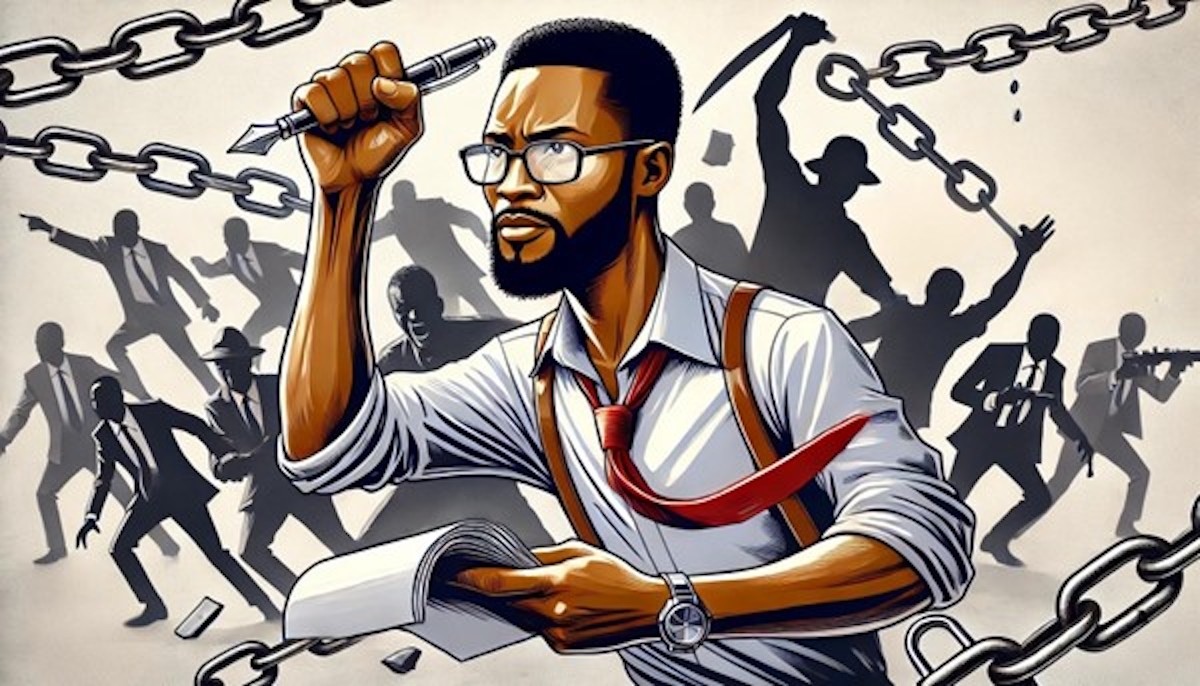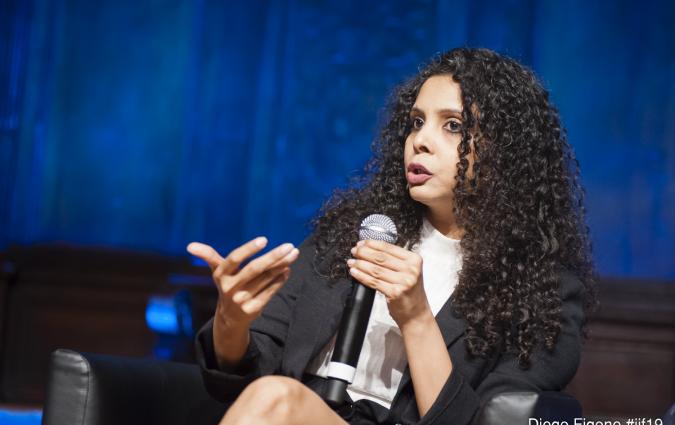In this piece
The silent war: how journalists face coordinated discrediting worldwide

A Nigerian journalist stands defiant against coordinated discrediting of journalists – an ongoing threat to press freedom. (Image: generated by DALL·E)
In this piece
Peter Nkanga’s investigation | Daniel Sánchez’s struggle | Alex Crawford’s experiences | Common tactics and patterns | Impact on journalists | Broader implicationsTwo days before the crucial Nigerian presidential election of February 2023, the website for the Foundation for Investigative Journalism (FIJ) went dark.
FIJ, founded and led by me, had exposed Landwey, a real estate investment firm, for receiving payments for undelivered housing projects. It seemed someone irked by the reportage had contacted DigitalOcean, FIJ's host, to claim we plagiarised the story from a newsletter.
Despite the patent falsehood, DigitalOcean took FIJ’s website offline. This incident highlights a disturbing global trend: coordinated efforts to discredit journalists.
From Nigeria to Mexico, Libya to Brazil, Pakistan to Azerbaijan, journalists face systematic campaigns to tarnish their reputations.
Peter Nkanga’s investigation
In early 2021, Nigerian journalist Peter Nkanga investigated activist and radio personality Ahmad Isah for BBC Africa Eye. Isah, known for securing justice for the oppressed via live radio shows, was filmed physically assaulting a woman. The BBC aired the footage, revealing both Isah's good and bad sides. Public backlash ensued, and Isah apologised publicly but privately retaliated against Nkanga. He accused Nkanga of plotting to kill him, sharing his phone numbers and home address on air. Threatened by Isah’s followers, Nkanga fled with his family and quit journalism.
Daniel Sánchez’s struggle
Mexican journalist Daniel Sánchez exposed corruption involving Interconecta, a video surveillance company. Two years after his story was published, DigitalOcean received a false copyright infringement claim and demanded the story's removal. Despite Sánchez providing clear evidence, DigitalOcean threatened to take down his entire website if the story wasn't removed. Sánchez reluctantly complied, highlighting how powerful entities use digital platforms to silence critical voices.
Alex Crawford’s experiences
Sky News correspondent Alex Crawford, renowned for her daring reporting from war zones, faced a similar campaign after a report on Libya’s mafia factions. An Arabic channel re-voiced and mistranslated her story, followed by a Twitter campaign accusing her of being an American spy. This coordinated effort to misrepresent her work aimed to undermine her credibility, showing how misinformation campaigns can distort journalistic integrity.
Common tactics and patterns
Discrediting journalists involves various tactics such as false copyright claims, social media harassment, and misinformation. Powerful individuals and entities often lead these campaigns, leveraging their influence to silence dissent. The goal is not just to attack the journalist's character but to undermine the credibility of their stories. For instance, Isah's followers believed Nkanga’s investigation was driven by malice, not truth-seeking. Similarly, Sánchez faced baseless copyright claims designed to erase his critical reporting from the internet.
Impact on journalists
The personal and professional impacts on journalists are profound. Peter Nkanga received death threats, forcing him to abandon his career and flee for safety. “The threats were sometimes direct, in terms of people identifying and telling me what car I drove, where I lived, and that I would be killed,” Nkanga recalled. Alex Crawford described her experience in Libya as “scary” for herself and her hosts, causing her to be moved to different hotels for safety. These cases illustrate the severe consequences journalists face, from threats to their lives to career-ending harassment.
Broader implications
These discrediting campaigns have dire implications for press freedom and democracy. Journalists play a critical role in holding powerful entities accountable. When they are systematically discredited, the public loses a vital source of truthful information. According to UNESCO’s Observatory of Killed Journalists, 34 journalists were killed in 2023, underscoring the lethal risks of pursuing the truth. Such statistics highlight the severity of the issue and the urgent need to protect journalists globally.
From Nkanga’s forced exit from journalism to Sánchez’s struggle with false copyright claims, these cases reveal a troubling pattern of powerful entities using underhanded tactics to silence critical voices. Supporting and protecting journalists is paramount in ensuring that the truth prevails and that those in power are held accountable.
This project and fellowship have been made possible by the support of the Thomson Reuters Foundation.
In every email we send you'll find original reporting, evidence-based insights, online seminars and readings curated from 100s of sources - all in 5 minutes.
- Twice a week
- More than 20,000 people receive it
- Unsubscribe any time



